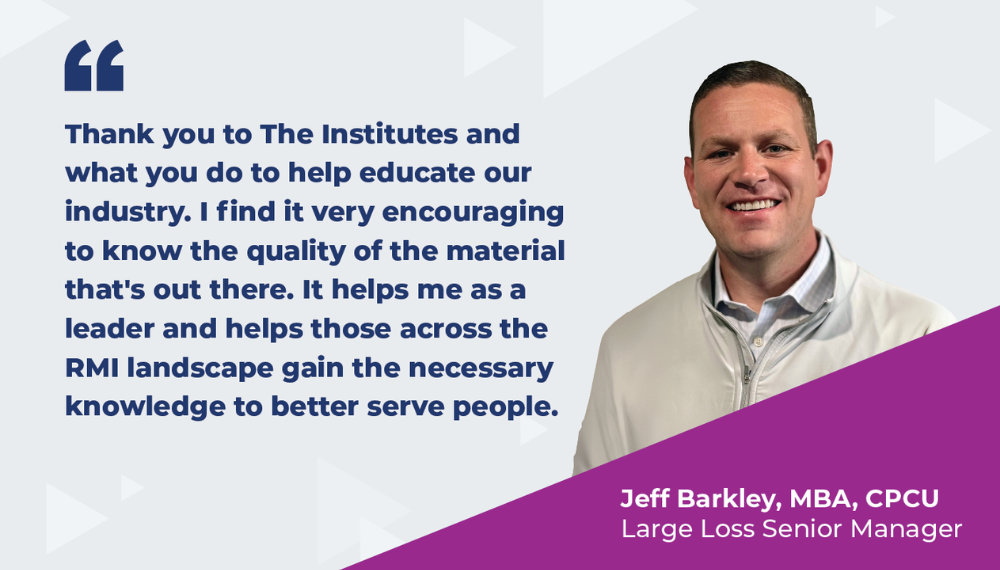Professional Development
The Journey of Earning Every Institutes Designation: Interview with Jeff Barkley
If you’re considering starting your professional development journey or earning your next designation, you might have a few questions. What kind of impact will it have on my career? Where should I start? Is it really worth the time and money?
We sat down with Jeff Barkley, a Large Loss Senior Manager, Adjunct Instructor at the University of Olivet, and completer of every single Institutes Designation as of September 2024 to discuss these exact questions. Jeff shares how his extensive education has helped him become a better leader, participate in initiatives across his organization, and improve his decision-making. Take a look!
Question: Why did you decide to earn every Institutes Designation?
Answer: There are a few reasons. The first designation I earned was the Associate in Insurance Services (AIS™) back in 2010. I started the designation at the University of Olivet, where I'm actually an adjunct instructor today, because they really encouraged students to pursue The Institutes Designations.
I had an economics professor who emphasized that he was going to cover a ton of information, and we would only remember 10% of it. One of the students asked, “What's the point if we're only going to remember 10%?” And I'll never forget his response: "Well, 10% of a lot is a heck of a lot more than 10% of a little.” That really stuck with me and shaped my view toward education. The things that resonate with you will help you connect dots in certain aspects of work.
My second designation was the Associate in Claims (AIC™), which I earned because of a dare. Then it became a little bit of an addiction. I made a bet with my director at the time, Renee. If I earned my AIC designation, she would promote me to Senior Adjuster. I don't think she thought I could do it so quickly. Long story short, I earned my AIC and received the promotion. And she never made a bet with me again.
Q: How has gaining all of that knowledge helped in your career?
A: It's definitely allowed me to participate in projects and initiatives that span core functions. It's given me the ability to speak the language of an underwriter, of a marketing professional, of a claims professional, and really connect those dots and communicate with the various areas within an insurance company. More importantly, it's helped me be a better teacher and a better leader.
With the depth and breadth of topics I've studied, I feel very comfortable positioning my team ahead of issues that I can see coming. As a very rudimentary example, I know that when we enter a hard market, underwriting is going to get a little more sensitive about risk referrals. Because I have that knowledge from what I've studied, I can keep my team ahead of the curve before the demands start rolling in.
Q: What do you consider to be your favorite or most valuable designation?
A: My favorite designation to earn was the Associate in Reinsurance (ARe™). Really early in my career, I didn't understand the extent of the capital infrastructure that supports the insurance industry. That really fascinated me, and I'm still fascinated in that area. I like to joke that if I were to redo my insurance career, I might pursue reinsurance.
However, my most valuable designation is my CPCU. It really is the gold standard of designations out there. Of all the designations I've participated in and earned, the CPCU— early in my career, especially—unlocked my ability to participate in conversations, projects, and initiatives that spanned the core functions of an insurance carrier.
My career has been wholly in claims, but CPCU helped me see the insurance space through the prism of marketing, underwriting, and claims. And that helped me take part in a lot more than I was able to prior to earning that designation.

Q: How long did it take you to complete each course?
A: That's a really tough question to answer, and I know a lot of other students can identify with that. It really depended on the season of life. While I was doing all of these designations, I also got married. I had four kids. I completed a master's degree. I changed employers three times and just had a lot of life in between. As I got toward the end, there's a couple that I did in just a matter of weeks because I had so many overlapping credits. But some took me months, if not up to a year to finish. The main thing is to never let your circumstances get in the way of your aspirations.
Q: Does your employer cover the costs of exams and materials?
A: I've worked for employers who have paid for designations, and I've worked for employers who encouraged us to invest in ourselves. And I understand both of those arguments. I won't pick one over the other, but I'll say to anybody that reads this: if you have an employer who is willing to invest in you—and even pay you for the performance increase that comes out of you learning new material—that's a really awesome gift.
But even if they don't, you should still consider investing in your own development because it won't return to you void. In hindsight, even though I've had employers pay for some of my designations and I've paid for some of them out of my own pocket, I would happily have paid for all of them. It's done that well by me.
Q: Any final words?
A: Thank you to The Institutes and what you do to help educate our industry. We have an ageing workforce, and I find it very encouraging to know the quality of the material that's out there. It helps me as a leader and helps those across the RMI landscape gain the necessary knowledge to better serve people, because that's what we're here for.
